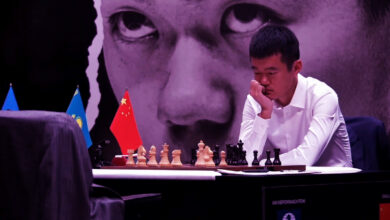After Kirsty Gilmour, more players come out in open about receiving online threats

After Scottish shuttler and CWG medall Kirsty Gilmour opened up about facing online threats of rape and murder from gamblers, other players are coming forward attesting to receiving similar online abuse.
India’s doubles star Chirag Shetty admitted to having received threats, while another shuttler added that it was almost a daily occurrence.
“Yeah like someone criticising a player is okay (you don’t feel great) but it’s okay to voice your opinion on someone playing good or bad. But to give someone threats similar to what Kirsty faced is just not done. Have received similar things in the past where they say all kinds of rubbish, ‘go die, I’ll kill you’, etc which obviously is because they might have put money on you and have lost,” Shetty said.
Shetty hasn’t reported the abuse officially, but insed many players were receiving such abuse. He also suspected it came from Indonesian accounts. “Cause they write in Bahasa. It’s from anonymous accounts. And mostly Indonesian.”
Another doubles shuttler Sikki Reddy said players copped abuse, win or lose. “You win or lose abuses are common on social media. Not just me every players goes through it and sometimes it’s very bad. The words they use are horrible. I can’t even say those words it’s that bad. And the most worst part is they bring family also into it. What have they done (over here) I don’t understand,” she said.
Reddy stressed that replying was no option. “And if we start replying them back they get more worse. So we don’t reply at all for those and they keep sending it. I don’t think the BWF also can do anything about it because all these are anonymous accounts and there are many. I block them off sometimes.”
Earlier, BBC reported how Gilmour had received threats and had reported them to the authorities. “It’s always from an anonymous account, no picture, no followers. My best guess is they are betting on matches and lost and they decided to take it out on me,” Gilmour was quoted the BBC.
“It is never someone that’s watched the match and knows about badminton the sport. I am basically a random horserace to them and it’s not gone their way so they get personal. Thankfully when I read this one I was in an OK frame of mind. It wasn’t a loss that particularly hurt me, so I was in an OK emotional state.”
She added that sometimes she laughed them off. “If it’s one word like “retire”.
“But if that had happened at a Commonwealth (Games) or Olympic Games with a lot riding on it and it was a culmination of months of specific training and then they said something it would not be as easy to handle.
“It hurts more when they target my play or me as a player. You can send a death or rape threat to anyone but when they make it really personal about how I am bad at my job because they put money on it – those hurt more,” she told BBC.
Her latest message suggested she had thrown her match, BBC reported. ‘It said: “11-5 then 18-15 to lose 18-21. All you want is fixing match to earn dirty money, huh?” It went on to use offensive language, threatening to send someone to rape her and saying “you are so idiot, ugly and dirty to play sport and to live.’”
The Badminton World Federation in a statement said it was taking measures to deal with the menace. The statement from BWF secretary Thomas Lund said: “BWF condemns all forms of bullying and is deeply concerned the nature of threats made towards Scotland’s Kirsty Gilmour last week. BWF strongly supports Kirsty Gilmour’s stance taken against these online trolls and offers its support to all players who may be on the receiving end of such abuse. We also support the involvement of the police in such matters as they have the tools necessary beyond those of the BWF to investigate these online abuse incidents thoroughly and to ultimately identify the perpetrators.”
It went on to add, “Players should also seek advice from the national Member Associations and coaches and managers to ensure such threats are dealt with appropriately. BWF does offer social media training to players and promotes the various tools available to players to protect their accounts and block and report such poorly behaved netizens.”
The statement also spoke of tackling the gambling issues in the sport. “BWF is also aware that players have been approached gamblers or people intent on manipulating matches previously via various social media channels. We do have a robust anti-match manipulation deterrence system in place which includes a ‘whleblower’ outlet for anyone in the badminton community to utilise should they be approached to fix matches. On top of this, BWF has indeed recently announced partnerships with Stats Perform and Malta Gaming Authority to bolster its efforts in fighting betting-related corruption in badminton with advanced monitoring technology.”
It encouraged players to speak out. “BWF encourages players to continue to speak up and report any online abuse related to gambling or direct approaches to manipulate matches as part of BWF’s overall efforts to ensure a clean, safe, and fair sport for all, ” the BWF statement added.
For independent player Subhankar Dey, not funded any government scheme, it took time to learn to ignore. “It happens a lot especially after losing a match, and since I’m not in good form right now. Not threats, but if we put vacation pictures, trolls assume we aren’t serious about the game and then it starts. If it gets too abusive, I delete the comments. But I’ve come up on my own as an independent player and don’t owe anyone an explanation, is how I deal with it.”
Dey lived and played five years in Denmark, and says the fake profiles that troll are both Indian and from outside. “It’s not in our hands so best to ignore,” he says.
The threats have deeper impacts on players’ psyche, and Gilmour told the BBC, “Recently me and another player were talking and realised we think in the middle of a game, when something happens, what level of abuse am I going to get for this? If they comment on my posts I report those to Instagram but a lot come through direct messages. I don’t know what can be done. I even worry that talking about it will invite more and give attention to these people.
“It is something we have just come to accept – another element we learn to live with,” Gilmour told BBC.







